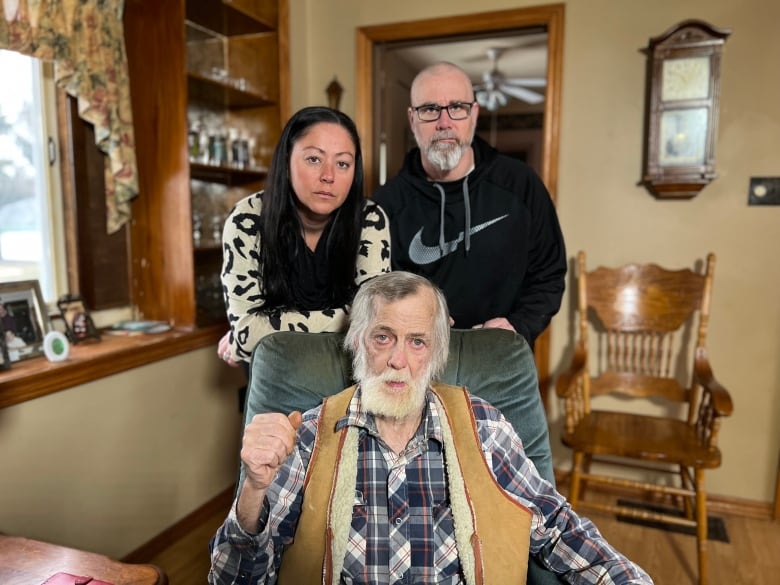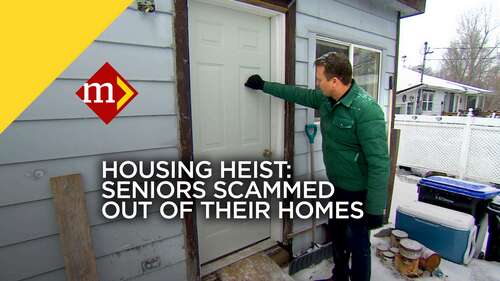The Ontario government is proposing legislation that could spell relief for homeowners who say they’ve been victimized by questionable liens on their homes by retroactively banning the use of the tool.
The legislation will be introduced some time between now and June 13, according to Public and Business Service Delivery Minister Todd McCarthy.
It will retroactively ban notices of security interest (NOSIs), he said.
We reveal seniors at risk of losing their homes after they say they were tricked into high-interest mortgages they did not want and cannot afford.
A NOSI is a legal tool — similar to a lien — that puts a financial claim against property titles in Ontario. They are often used by companies that finance or lease equipment to ensure payment.
In some cases, NOSIs have been used in elaborate schemes against homeowners — schemes that CBC’s Marketplace and Go Public have covered extensively.
At times, NOSIs have been “used as an instrument of blackmail,” McCarthy told Marketplace.
He said the plan comes after consultations with various groups, including consumer advocates, law enforcement and families of victimized seniors, as well as vendors who use NOSIs legitimately.
Last year, a Marketplace investigation revealed how an elaborate scheme involving the use of NOSIs left some seniors across Ontario at risk of losing their homes.
The investigation found that liens had been applied to their properties —they say without their understanding or knowledge — after they were signed up for equipment rental contracts and ultimately into mortgages with interest rates of up to 25 per cent.
Toronto-based lawyer Greg Weedon, who represents victims of questionably used NOSIs, says the proposed legislation, if passed, is “probably the single best consumer protection piece of legislation that I’ve seen in some time now.”

McCarthy said while NOSIs can have a legitimate purpose, land registry offices can’t distinguish between legitimate and criminal use.
“So, we have decided to ensure that there can be no further criminal activity associated with this at all.”
He also said legitimate users of NOSIs will still have other remedies to seek payment for things such as unpaid leases or financial agreements.
Scheme previously exposed by Marketplace
Karl Hoffmann was among more than 20 alleged victims Marketplace found when investigating NOSI-related high-interest mortgage scams.
Marketplace spoke to Hoffmann, then 79, for a 2023 story. He had suffered a brain aneurysm nearly 40 years prior, and his family said he struggled to make decisions.
Property records showed 11 liens were registered on Hoffmann’s property for various home equipment rental contracts by several different companies from 2017 to July 2021 worth a total of $103,478.66. His family said Hoffmann had no idea, and that he never knew how to use the equipment, nor did he seek it out.

Then in late 2022, he got a foreclosure letter saying he had two weeks to leave his home of over 50 years in Bowmanville, Ont.
A one-year mortgage had been registered on Hoffmann’s property for $130,000 with 25 per cent interest.
Hoffmann’s family said he hadn’t signed any mortgage paperwork, and if he had, he hadn’t understood it. The family hired Weedon to fight the foreclosure.
In an interview with Marketplace following the Ontario government’s announcement, Hoffmann’s daughter-in-law, Melissa Irons, called the plan “great news,” saying the property would finally be back in Hoffmann’s name.
Unfortunately, he died recently.
“It’s just sad that he’s not here to be able to see this, to have some of this weight lifted off of his shoulders,” said Irons.
Marketplace has also previously reported on the ease with which NOSIs can be applied to a property by installing a doorbell camera worth $200 at the CBC London bureau and then registering a $25,000 lien on the property for that equipment.
Karen Norgaard from Cornwall, Ont., contacted Marketplace after signing a 10-year contract with an HVAC rental company in late 2021.
She says she had no idea a NOSI for more than $15,000 had been put on her property.
It was Marketplace who broke the news to her.
She says she then spent hundreds of hours fighting back against the HVAC company. She took it to Ontario Small Claims Court to have the contract cancelled and the NOSI removed. In the end, she says, she won.
“It should have been looked at earlier, but the government seems to be very slow to change anything,” Norgaard said, referring to the government’s plan to abolish NOSIs.
McCarthy says this legislation means Ontarians won’t have to take on this fight in court themselves.
“What we’re doing is planning to bring in legislation that will grant relief to all, without them having to incur the cost of a lawyer, without them having to go to court to fight something that was basically put against their title on a fraudulent basis.”




